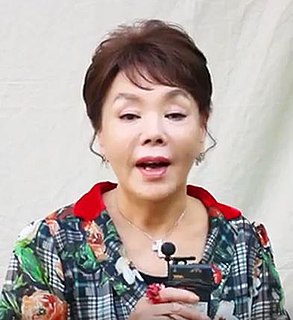| Kim Young-ok | |
| Hangul | 김영옥 |
|---|---|
| Revised Romanization | Gim Yeong-ok |
| McCune–Reischauer | Kim Yŏng-ok |
Kim Young-ok, a Korean name consisting of the family name Kim and the given name Young-ok, may refer to:
Kim or Gim (김) is the most common surname in Korea. As of the South Korean census of 2015, there were 10,689,959 people by this name in South Korea or 21.5% of the population. Kim is written as Hangul: 김 (gim) in both North and South Korea. The hanja for Kim, 金 can also be transliterated as Hangul: 금 (geum) which means "metal, iron, gold". The academic community is divided as to why 金 is not read as 금 in the case of surname and why it is read as 김 instead. For more information, please refer to discussion page of 김. The Kim family is also the ruling family in North Korea.
- Young-Oak Kim (1919–2005), Korean American men soldier
- Kim Young-ok (actress) (born 1937), South Korean actress
- Kim Soo-mi (born Kim Young-ok; 1949), South Korean actress
- Young Kim (born Kim Young-ok; 1962), Korean American women politician
- Kim Young-ok (speed skater) (born 1966), South Korean women speed skater
- Kim Yeong-ok (born 1974), South Korean women basketball player
- Kim Yong-ok (weightlifter) (born 1976), North Korean women weightlifter

Young-Oak Kim, a United States Army officer during World War II and the Korean War and a civic leader and humanitarian. He was a member of the U.S. 100th Infantry Battalion and 442nd Regimental Combat Team, and a combat leader in Italy and France during World War II. He was awarded 19 medals, including the Distinguished Service Cross, two Silver Stars, two Bronze Stars, three Purple Hearts, a Bronze Medal of Military Valor, a Légion d'honneur, a Croix de guerre, and (posthumously) the Korean Taeguk Cordon of the Order of Military Merit. After his military career, Kim dedicated his life to public service and was an active founder and leader of several non-profit organizations for underserved communities throughout Southern California. He died of cancer at the age of 86. In May 2016, members of the Congressional Asian Pacific American Caucus held a press conference, organized by the Council of Korean Americans, to call on President Barack Obama to posthumously award Kim the nation’s highest civilian honor, the Presidential Medal of Freedom.

Kim Young-ok is a South Korean actress who debuted in 1957. She is known as South Korea's "National Grandma" for her many portrayals of grandmothers in film and television.

Kim Soo-mi is a South Korean actress. She has had a prolific career in film and television. Kim debuted in a talent contest in 1970, then shot to fame in Country Diaries. The landmark TV series aired for almost 20 years, making Kim one of the most popular Korean actresses of the 1980s.



